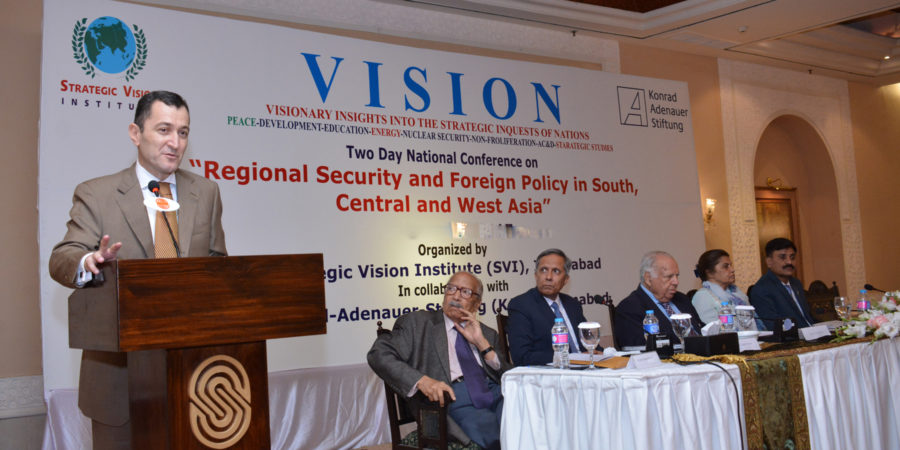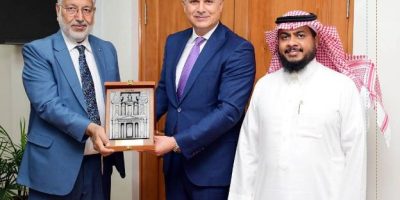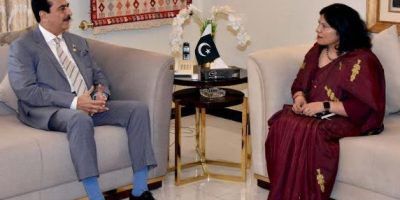Tajikistan ambassador says cooperation with Pakistan multiplying

ISLAMABAD, MAY 17 (DNA) = Ambassador of Tajikistan Sherali Jononov while speaking on the 2nd day of the conference arranged by Strategic Vision Institute (SVI) briefed the audience about the potential that Central Asian states offered to Pakistan and rest of the world.
Ambassador Sherali also briefed the audience about CASA 1000 project, which is in the final stages and shall cater to energy needs of Pakistan after completion. He said, Tajikistan’s economy was growing at a fast speed thus making it a lucrative destination for foreign investors.
Ambassador Sherali called upon the Pakistani businessmen to cash in on Tajik potential in various fields. He also mentioned high level contacts between the two countries that had bring both countries further closer.
Ambassador Sherali further said both President of Tajikistan Emomali Rahmon and Prime Minister Nawaz Sharif had an understanding and vision to their respective countries forward economically and socially.
Meanwhilke The think tank called on United States, Russia and China to contribute to contribute to peace and prosperity in the region.
It emphasized the need for a political and security architecture in South Asia where prospects for peaceful resolution of disputes were diminishing due to India’s aggressive posture towards its neighbours particularly Pakistan. It noted that India had been emboldened by its Strategic Partnership with United States, which was not only serving to contain China, but was also undermining Pakistan’s security.
SVI observed that India was investing in Afghanistan and Iran to pave the way for expansion of its influence in West Asia. The think tank counseled Pakistan government against participation in multilateral security arrangements that could antagonize another Muslim country. It also called for mollifying Afghan concerns, despite being misplaced, for developing better connectivity with Central Asia.
The think tank recommended continued engagement with United States and at the same time asked the government for better planning and negotiating terms of cooperation with China so as to maximally benefit from China’s rise.
Former Defense Secretary Lt Gen ® Naeem Khalid Lodhi, speaking at one of the sessions during the day, said Pakistan was not in a position to side with any of the major powers. He said instead of branding others as friends and enemies, it was important to keep an eye on their interests and align with those that suit us, while resisting their interests that adversely affect us.
Dr Tughral Yamin Malik, Department of Peace and Conflict Studies, NUST, recommended diversification of Pakistan’s foreign policy. He said the country’s foreign policy had become too much India focused and therefore it needs to be retuned to make it look beyond India.
In his view the outlook of Pakistan’s external relations would have been diametrically different if only half of the efforts made to improve relations with India were dedicated for better ties with Iran and Afghanistan.
Amb ® Fauzia Nasreen, Center for Policy Studies, COMSATS, pointed to the emerging challenge of India, Afghanistan, Iran nexus for Pakistan. She advised a nimble footed foreign policy that could balance between Iran and Saudi Arabia, address Afghanistan’s concerns, and explore prospects of improvement in relations with India.
Dr Saif Malik said projects like TAPI & CASA 1000, despite all the progress they have achieved so far, face issues of financing, uninterrupted supplies, and security. “TAPI foremost requires safety in Afghanistan, whereas, realizing CASA-1000 will require strategic actions, long-term vision, and public – private sector partnership,” he underlined.
The success of the projects would, meanwhile, promote inter-regional cooperation, investments in social services, and encourage community contacts, besides strengthening politico – economic development of the region in the long run, he added.
Dr Muhammad Nadeem Mirza, QAU, said China was in the third phase in its journey to becoming a great power of the international system, which is the partnership phase, whereas the fourth and final phase would be the ‘leadership’ of the international system. He analyzed the Chinese perspective of the great power politics in Central Asia.
He believes that the most interesting aspect of the debate is why Russia despite being the dominant power in the region was giving space to other great powers particularly China in its privileged area of influence. =DNA
================
Related News

IIUI, Jordan aim for stronger university partnerships
ISLAMABAD, JUL 23 (DNA): Dr. Maen Khreasat, Ambassador of the Hashemite Kingdom of Jordan toRead More

Nepal Ambassador calls on Chairman Senate Syed Yousuf Raza Gilani
ISLAMABAD, JUL 23 /DNA/ – Chairman Senate Syed Yousuf Raza Gilani has said that PakistanRead More


Comments are Closed